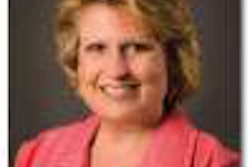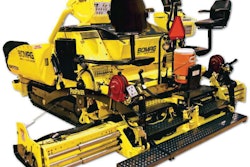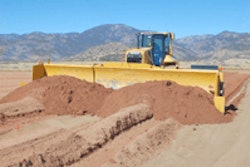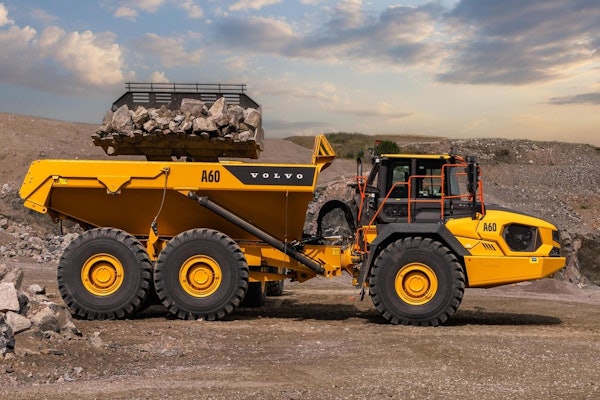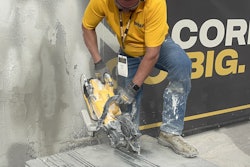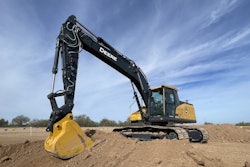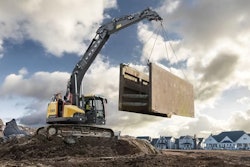Go Ahead, Tax Us,
We Need the Infrastructure.
By John Lattta, Tina Grady Barbaccia and Tom Anderson
 A nother major transportation industry is prepared to support a hefty tax increase on itself to help provide the healthy infrastructure it must have.
A nother major transportation industry is prepared to support a hefty tax increase on itself to help provide the healthy infrastructure it must have.
Barge operators are prepared to accept a 30 to 45 percent increase in the diesel tax paid by barge and tow operators. A plan set to go before Congress calls for a six to nine cent addition to the 20-cent-per-gallon diesel tax now paid by barge operators. The American Trucking Associations and the Truckload Carriers Association have both supported a diesel tax hike for the same reason – the new revenue would help provide better roads and less congestion.
“More than half of the 240 Army Corps of Engineers-operated inland navigation locks have outlived their economic design lives by more than 50 years. In fact, the American Society of Civil Engineers’ recent report card graded the inland waterways a D-,” says Cornel Martin, President and CEO of the Waterways Council, a national public policy organization that advocates for a properly funded and well-maintained system of inland waterways and ports.
Raising the grade and the efficiencies of our locks and dams is essential, says Martin. “If adopted by Congress, these recommendations will help improve the reliability of our waterways so that our nation continues to benefit from our energy-efficient, congestion-relieving waterways transportation system.”
A starting point is a set of recommendations that would prioritize, over a 20-year period, navigation projects across the entire inland waterways system, improve Corps of Engineers’ project management and processes to deliver projects on time and on budget, and recommend an affordable funding mechanism to meet system’s needs. The recommendations were prepared by the Inland Marine Transportation System Investment Strategy Team comprised of key U.S. Army Corps of Engineers personnel and members of the congressionally established Inland Waterways Users Board, a federal advisory committee that provides advice to Congress and the Assistant Secretary of the Army for Civil Works.
“If adopted by Congress, these recommendations will help improve the reliability of our waterways so that our nation continues to benefit from our energy-efficient, congestion-relieving waterways transportation system,” says Martin. “New funding parameters included in the proposal will necessitate an increase in the 20-cents-per-gallon fuel tax currently paid by industry, the only segment of system users who are taxed, but it is viewed as worth the investment to ensure the future viability of America’s inland waterways system. And, if adopted, it would tax the system in a more equitable manner than recent White House proposals which would more than triple the tax levied on freight moving on our inland waters.
“Modern infrastructure, whether it be locks and dams or roadways and bridges, is essential to the economic health of our nation, from U.S. competitiveness in world markets, to energy efficiency, to congestion relief, to environmental protection, to modal competition and to the sustainment of jobs. This is good public policy for our nation and its future,” says Martin. v
Partners?
According to Cornel Martin, President and CEO of the Waterways Council, waterborne transportation is better for the environment and our consumption of energy. Just one barge has the same capacity as 70 trucks or 16 rail cars, with the lowest carbon (C02) emissions among the three modes. Moving a typical 15-barge tow means 1,050 less truck transits on our highways. And towboats pushing barges have the best energy efficiency record among all transportation options, traveling 576 miles on one gallon of fuel as compared to 413 for train or 155 for truck.
Deputy DOT chief:
“Markets alone” will not create essential transit-oriented development
 Public investors need the ‘spur’ of cooperating government agencies to create essential transit friendly communities according to John Porcari, deputy secretary of transportation.
Public investors need the ‘spur’ of cooperating government agencies to create essential transit friendly communities according to John Porcari, deputy secretary of transportation.
Porcari was speaking to the Senate Committee on Environment and Public works on March 24 about opportunities to improve energy security and the environment through transportation policy. DOT, he said, will create an Office of Livable Communities within the office of the Secretary of Transportation.
He said: “We propose, within our FY2011 budget request, that the Office would coordinate the distribution of $200 million for capacity enhancement at state and local transportation agencies. Through this support, state and local agencies could be better equipped with the tools, data and training needed to understand how transportation, housing, economic development and other infrastructure investments impact one another.
“Planning and capacity enhancement grants to state and local governments may, at first glance, appear to involve small sums of money, but they leverage far larger sums of private and public transportation and real estate investment over periods of many years. Because transit-oriented development requires private investment spurred by the cooperation of multiple governmental bodies, we cannot depend on markets alone to create these communities. Sustainable development that is transit –oriented and friendly to pedestrians and bicyclists will help foster economically competitive, healthy, opportunity-rich communities, while reducing petroleum consumption, increasing energy security, and reducing emissions of greenhouse gases and other pollutants.” v
Our Man Wins Big
 Jack Roberts, our trucks editor, has won a Jesse H. Neal Award, the Business to Business media’s highest award for journalism, for an article that was our feature story last December. Robert’s won for “Best Technical Content.” The story was an incisive look at the battle between the two different engine technologies that are fighting for supremacy in trucks this year as Environmental Protection Agency regulations demand cleaner and cleaner exhaust.
Jack Roberts, our trucks editor, has won a Jesse H. Neal Award, the Business to Business media’s highest award for journalism, for an article that was our feature story last December. Robert’s won for “Best Technical Content.” The story was an incisive look at the battle between the two different engine technologies that are fighting for supremacy in trucks this year as Environmental Protection Agency regulations demand cleaner and cleaner exhaust.
“It’s always an honor to be recognized for your efforts as a journalist – particularly for a story as
important to our readers as this one. This is really a team award, because no editor works alone,” said Roberts after the awards ceremony in New York City.
This is Roberts’ second Neal Award. He is the truck editor for Randall-Reilly magazines in both the construction and trucking industries.
A new Hall of Fame
Move over Babe Ruth, Joe Namath and Michael Jordan, there’s a new “Hall of Fame” coming to America that will honor the visionaries and game-changers in the transportation design and construction industry.
The American Road and Transportation Builders Association’s Transportation Development Foundation (ARTBA-TDF) is creating a “Hall of Fame” to honor individuals or families from the public and private sectors who have made extraordinary contributions to U.S. transportation development and demonstrated exceptional leadership throughout their lifetime.
“The transportation design and construction industry is full of talented, and often daring, men and women who helped build an infrastructure network that dramatically improved the economic, cultural and social fabric of America,” says ARTBA-TDF Chairman Leo Vecellio.
Anyone can nominate a candidate. ARTBA membership is not required. Individuals can be living or inducted posthumously. Information about the criteria and nomination forms are available at www.artbatdf.org. Nomination forms must be received by close of business Friday, July 2.
Are Tolls Inevitable?
 It was an overwhelmingly favorable audience, but regardless Michigan Chamber of Commerce president Rich Studley wasn’t going to miss the opportunity to reinforce his belief that tolling highways is part of the solution to the funding crunch crumbling his state’s thoroughfares.
It was an overwhelmingly favorable audience, but regardless Michigan Chamber of Commerce president Rich Studley wasn’t going to miss the opportunity to reinforce his belief that tolling highways is part of the solution to the funding crunch crumbling his state’s thoroughfares.
“Nearby states like Ohio, Indiana and Illinois all make good use of toll roads,” Studley stated in a live online chat hosted by the Michigan press organization MLive.com on the heels of a series of articles on transportation funding. “One of the recommendations from the Transportation Funding Task Force is that we should consider that option as part of a comprehensive solution.”
Of the online participants issuing their votes, 71 percent agreed that toll roads are a good solution for Michigan’s funding issues.
Asked by Better Roads for examples of highway stretches Studley would consider as tolling candidates, the co-chair of the Michigan Transportation Funding Task Force cited the interstates that freely move commuters through his automobile-patriarchal state en route to its toll-toting neighbors in the Great Lakes region.
“Toll roads would not be appropriate for local streets or county roads,” wrote Studley. “They would be more appropriate for sections of our interstate highway system, especially in areas where there is a need for new construction to complete the system or major expansion projects. The east-west route from Detroit to Chicago along I-94 carries a lot of interstate traffic and might be appropriate for consideration.”
Joining Studley in the forum was the Michigan Infrastructure and Transportation Association’s Mike Nystrom, newly named the organization’s executive vice president. “Toll roads are just one component that should be part of a comprehensive plan to invest at a more appropriate level here in Michigan,” wrote Nystrom. “(It’s) very challenging to take our current interstate that has been paid for with significant federal dollars and turn it into a state-owned toll system.
Nystrom doesn’t foresee toll booths in the state for at least five if not 10 years, “but the concept should be considered for our future.” v
McCain – Feingold…
AGAIN
Hey look, two senators from opposite sides, working together on something worthwhile. And they have a track record. It’s McCain-Feingold II
You’ll remember the Bipartisan Campaign Reform Act of 2002. These two senators were chief sponsors of the 2002 law that that amended the Federal Election Campaign Act of 1971 that regulates the financing of political campaigns. Now they’re head-hunting for employees the administration appoints, but, according to these two gunslingers, doesn’t need.
Russ Feingold (D-Wis) and John McCain (R-Az) are reintroducing an effort to cut down on wasteful spending and reduce government bureaucracy by cutting the number of Executive Branch political appointees. Feingold and McCain have previously introduced the legislation to cut thousands of unnecessary political positions, doing so in both the Clinton and Bush administrations.
“Unnecessary bureaucratic positions not only waste taxpayer dollars, but also make government less effective and less responsive to the people it represents. In the face of record deficits, this bill offers a good way to save while improving the way government works,” said Feingold.
“In this time of economic crisis, we must do everything possible to eliminate waste and make the federal government smaller and more efficient,” said McCain. “This bill is simple – it will save money and result in a more streamlined executive branch.”
Exports: A “lifeline” for the construction equipment industry
U.S. construction equipment exports dropped more than 38 percent in 2009 compared to the previous year for a total $12.8 billion worth of machinery shipped to other nations, with declines of between nearly 30 to 50 percent for major world regions.
The good news is that overall, quarter-to-quarter declines steadily improved, ending with a fourth-quarter 2009 gain of 26 percent over the third quarter, according to the Association of Equipment Manufacturers (AEM), which consolidates U.S. Commerce Department data for off-road equipment with other sources into quarterly export trend reports.
“Exports have literally been a lifeline for the construction equipment industry, which saw U.S. business plummet more than 40 percent last year and unemployment soar to more than double the national average,” stated AEM President Dennis Slater. “Global trade has been a significant source of industry expansion in recent years, and many economies are now rebounding faster than the U.S.”
Slater said it was “essential” that federal government policies make it easier for American companies to pursue international business, and for international buyers to come to America.

